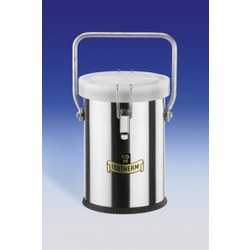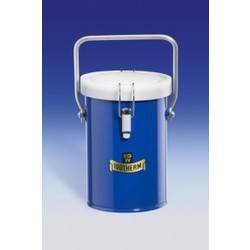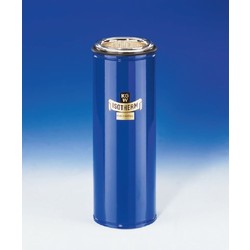Προϊόντα
Αναζήτηση
Κατασκευαστές
Υπηρεσίες
Διακριβώσεις (Διαπιστευμένο Εργαστήριο από το ΕΣΥΔ) Συντηρήσεις - Επισκευές Εργαστήριο Mέτρησης καθαρών χώρων (με Πιστοποίηση Lloyd's) Έλεγχοι Καταλληλότητας (IQ/OQ/PQ) Temperature/ Humidity Mapping Μετρήσεις υγείας & ασφάλειας Μελέτες επικύρωσης Μελέτες δόνησης & θορύβου Οργάνωση ΕργαστηρίουΔοχεία Dewar
Admissible Operation Conditions for Standard Glass Flasks
Temperature range Dewar -200°C to +200 °C Temperature range other components -10°C to +80 °C Pressure range depressurised
Standard Dewar flasks are not appropriate for the use of liquid and gaseous helium. Special design is available on request.
Standards and Guidelines
All of the EMCLAB glassware are manufactured considering - Guideline of pressure devices", directive 97/23 EC and DIN 12492 "Equipment with vacuum insulation". Under the condition that there are any standards for joint parts such as spherical ground joints or conical ground joints, those will be utilised (e.g. DIN 12242-1 and DIN 12244-1).
Verifications
Each of the EMCLAB products is subject to individual verification and identification, as well as the documentation of all manufacturing data.
Testing device for measurement of the LN2 evaporation rate Helium leak test device Ultrasonic wall thickness measuring instrument Vacuum measuring and calibration device Temperature measuring and calibration device Water and compressed-air testing device for reaction vessels Temperature testing device for columns
For the evaporation rates of Dewar flasks mentioned in the catalogue, the flasks were covered with the appertaining lid respective plug, and were verified with the coolants (liquid nitrogen, or dry ice) mentioned in the catalogue. The figures (evaporation rate) are stated in the catalogue in L/h (litres per hour) or as holding time in hours.
Material
- Glass
All the glassware from EMCLAB are made of borosilicate glass 3.3 DIN/ISO 3585. The glass has the following characteristics:
Chemical characteristics
- hydrolytic resistance : according to DIN-ISO 719 (98°C)
- acid resistance : according to DIN12116, acid class 1, DIN-ISO 1776
- alkaline resistance : according to DIN 52322, DIN 52322-A2, ISO 695-A2
Optical characteristics
- spectrum region, where the : 310-200 mm absorption is negligible low
Physical characteristics
- linear expansion factor : 3,3 x 10-6 1/K (at 20°C-300°C)
- density : 2,23 g/cm3
- specific thermal capacity : 910 J/kg K
- transformation temperature : 525 °C







